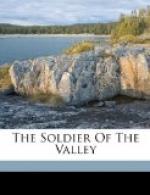The school-house gave me shelter. I groped my way to my desk and there sank into my chair, leaned my head on my hands, and closed my eyes. I wanted to shut out all the world. Here in the friendly darkness, in the quiet of the night, I could think it all out. I could place myself on trial, and starting at the beginning, retracing my life step by step, I would find again the course my best self had laid down for me to follow. For the moment I had lost that clear way. Blinded by my seeming woes, I had been groping for it, and I had searched in vain. But now the dizziness was going, and as I sat there in the darkness, my eyes closed to shut out even the blackness about me, the light came.
After a long while I looked up to see the moon high over the pines on the eastward ridge, and its yellow light poured into the room, casting dim shadows over the white walls, and bringing up before me row on row of spectre desks. The chair I sat in, the table on which I leaned were real enough. They were part of my to-day, but that dim-lighted room was the school-house of my boyhood. The fourth of those spectre desks measuring back from the stove, was where Tim and I sat day after day together, with heads bowed over open books and eyes aslant. That was not the same Tim who had passed me a while before, swaggering and singing in the joy of his conquest; that was not the same Tim who had stood before me that very afternoon in all the pomp of well-cut clothes, drawing on his whitened hands a pair of woman’s gloves; that was not the same Tim who by his artful lies had won what had been denied my stupid, blundering devotion. My Tim was a sturdy little fellow whose booted legs scarce touched the floor, whose tousled black head hardly showed above the desk-top. His cheeks would turn crimson at the thought of woman’s gloves on those brown hands. His tongue would cleave to his mouth in a woman’s presence, let alone his lying to her. That was the real Tim—the rare Tim. To my eyes he was but a small boy; to my mind he was a mighty man. The first reader that presented such knotty problems to his intellectual side was but part of the impedimenta of his youth, and was no fair measure of his real size. That very day he had fought with me and for me; not because I was in the right, but because I was his brother.
A lean, cadaverous boy from along the mountain, a born enemy of the lads of the village, had dared me. I endured his insults until the time came when further forbearance would have been a disgrace, and then I closed with him. In the front of the little circle drawn about us, right outside there in the school-yard, Tim stood. As we pitched to and fro, the cadaverous boy and I, Tim’s shrill cry came to me, and time and again I caught sight of his white face and small clinched hands waving wildly. I believe I should have whipped the cadaverous boy. I had suffered his foul kicks and borne him to the ground;




